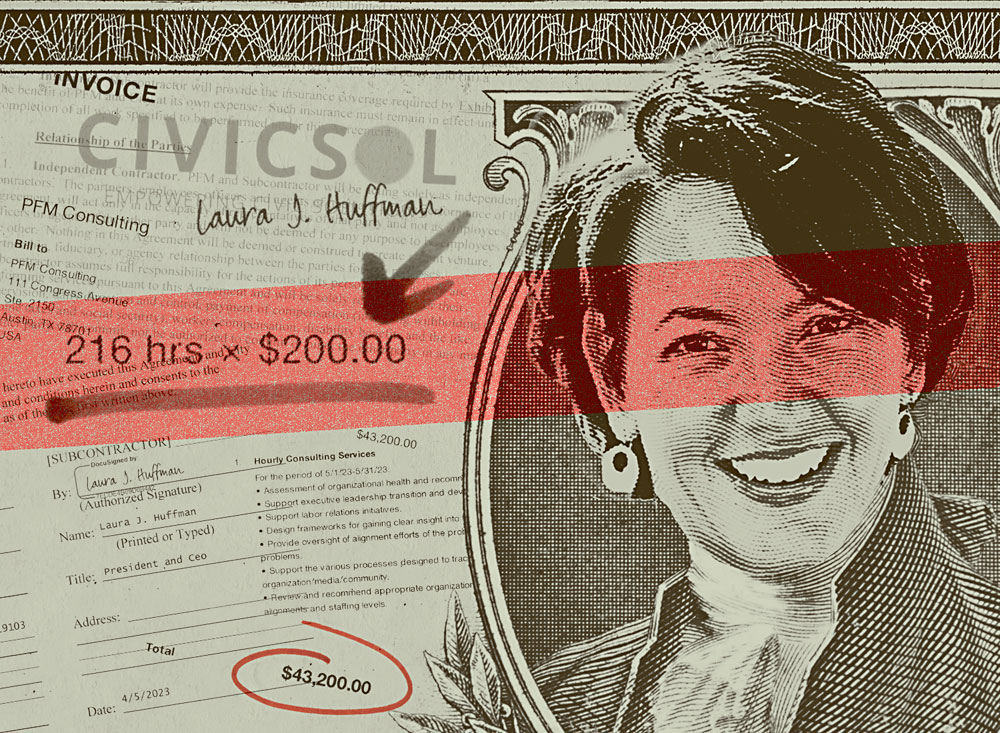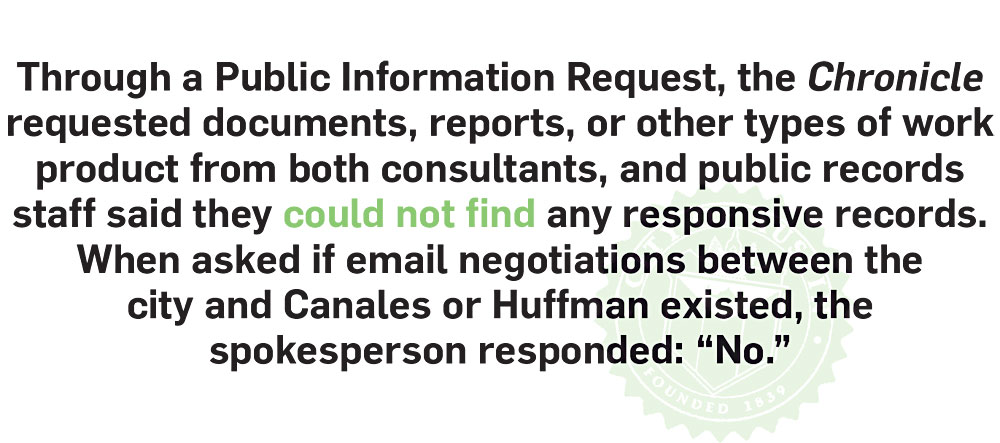Consultants Given Lucrative City Contracts Without Council Approval
City paid friends of City Hall top brass $300,000 through subcontracting scheme
By Austin Sanders, Fri., Sept. 15, 2023

How would you like a job that pays roughly $30,000 a month and requires no documented work output?
That's the kind of gig two longtime associates of Interim City Manager Jesús Garza and Mayor Kirk Watson landed this year, without competition from other candidates. From February to July, each was paid roughly $150,000 in taxpayer dollars to provide vaguely defined consulting services through subcontracts that were not approved by City Council – even though that amount of money usually requires Council authorization.
The two consultants – Laura Huffman and Joe Canales – are on track to end the year as two of the highest-paid workers at City Hall (though as outside consultants, they don't get benefits offered to full-time employees, such as health care). At the rate the pair has been billing, each could make more than $420,000 by year's end – an annualized rate that exceeds that paid to Garza ($350,000) and approaches that paid to Austin Energy General Manager Robert Kahn ($475,009), the city's two highest-paid full-time workers.
It is not surprising that people with prior City Hall experience and long histories with the two men currently ruling the second and third floors of that building were brought back into the fold during a tumultuous time for the city of Austin's bureaucratic machine. In a statement, Garza said as much.
"The Mayor and Council brought me on board to be a change agent," he said. "To be effective in providing results, I did bring in people I know, including Laura and Joe, because of the breadth of experience and knowledge they both have, not just about city government, but the City of Austin specifically."
Bringing them on board through subcontracts rather than initiating new contracts, which would have required Council approval, "afforded us with the mechanism for bringing Laura and Joe on to assist me in acting quickly and decisively," Garza continued. "The results we've achieved in a number of areas already, including legislative analysis, compensation structure evaluation and labor negotiations, speak for themselves."
It is true that City Hall was in disarray when Garza was hired (in the wake of previous City Manager Spencer Cronk's ouster in February) and that the organization needed urgent change. It is also true that there are ways to expedite consultant contracts needing Council approval that strike a balance between urgency and transparency, which is both expected in a city that claims to value transparency and required by Chapter 252 of the Texas Local Government Code, which sets out procurement rules for municipalities. It appears that did not happen here.
Details about Huffman's and Canales' work and pay have largely been obscured from the public eye – even from Council members and their aides – until now. Using documents obtained through public information requests and interviews with current and former city employees, as well as current and former Council members and aides, the Chronicle's investigation uncovered how the city was able to hire the two consultants without Council authorization.

Getting the Band Back Together
On March 1, the city announced a slew of high-profile leadership changes initiated by the interim city manager. "Garza has recruited a group of seasoned professionals who will join him on the interim leadership team," the press release said. Joe Canales, a longtime deputy city manager and Garza's top aide during his 1990s stint at City Hall, was given the title of "special assistant to the interim city manager." Laura Huffman, who worked as an assistant city manager during the same period and who has been a Watson ally since, would become a "consultant in change management."
The press release gave no further detail about what work they would be performing. The same news release also announced that Bruce Mills and Jim Smith, two other Nineties-era City Hall leaders, would return in leadership roles, but they were hired as temporary employees, not retained as independent contractors. Salary information obtained through a PIR shows Mills is being paid an annual salary of $287,000 as interim assistant city manager, and Smith $285,000 as Austin-Bergstrom International Airport director.
In April, under the umbrella of a 2017 city contract with a financial advising firm, staff signed subcontracts with Huffman (through her consulting firm CivicSol) and Canales. Their work, per the subcontracts, would include advising on "organizational health" and "high priority problems." Per directives laid out in Sec. 252 of the Local Government Code and the city's procurement manual, at some point their expensive new jobs would have triggered a Council vote had they not been obscured by the subcontracting maneuver.
The Chronicle shared the results of our investigation with all 11 members of City Council and asked them to comment, specifically, on the contracting arrangement – which appears, at least, to be an end run around Council authority. Only the mayor took us up on our offer; everyone else either declined to comment outright or said they did not have enough information about the contracts to provide an informed statement.
Watson said that Garza was hired to stabilize a "huge and complicated organization in the wake of a major upheaval" and to do that, Garza "brought in several experienced professionals who know how to make this organization run well." That's good management, the mayor added. Council members we've talked to have agreed that the city organization is operating much more efficiently than under prior management.
Regarding the terms of the two subcontracts, Watson says that Garza "fully briefed" CMs "about the functions and compensation for the temporary positions when he created them." Four CMs tell us they don't recall, specifically, a conversation about compensation for Huffman and Canales, though they do recall conversations about Garza's plans to contract with the two consultants. While paying qualified consultants high rates is not unusual, paying a contractor six figures in four months without explicit Council authorization and without documentation of their work product is.
Outside the Scope
Copies of the subcontracts with Canales and Huffman obtained by the Chronicle through PIRs show that they have been paid at rates of $190 per hour and $200 per hour, respectively, to provide a range of nebulous services including the design of "frameworks for gaining clear insight into the specifics of high priority problems confronting the City of Austin." The full list of tasks the two consultants were authorized to perform, per their subcontracts with PFM, are identical, and exactly as follows:
• Assess organizational health and recommend appropriate workforce initiatives.
• Support executive leadership transition and development for new and existing leaders.
• Support labor relations initiatives.
• Design frameworks for gaining clear insight into the specifics of high-priority problems confronting the city of Austin.
• Provide oversight of alignment efforts of the problem statements and subsequent accountabilities and strategies assigned to address these problems.
• Support the various processes designed to track and update projects for the city manager/mayor and Council/the city organization/media/community.
• Review and recommend appropriate organizational changes that can include organizational structure, reporting relationships, program alignments, and staffing levels.
The broad range of duties Canales and Huffman were authorized to perform has given them extensive authority over a range of organizational and policy areas. But the master agreement under which their subcontracts are being paid – authorized by Council in 2016 – specifies a much more narrow scope of financial advising work.
When Council authorized staff to negotiate and execute a contract with PFM Financial Advisors LLC in 2016, it was to provide "recommendations on bond sales, financing structures, and other financial planning services," according to the recommendation for Council action (RCA) document created by city staff following the competitive solicitation process to find a vendor for those services.
The RCA is how staff tells Council why a certain vendor is best for a particular job. Following the staff recommendation, Council authorized staff to negotiate a contract with PFM with an initial term of five years at $1.5 million with the option of three one-year extensions, for a total potential contract length of eight years at $2.4 million. According to the city's public financial database, the contract currently has about $830,000 remaining from the initial authorization.
The contract with PFM, signed in April of 2017, didn't expand the scope of PFM's work, and it has not been amended since it was executed, a city spokesperson told the Chronicle. The contract notes that if there is "any inconsistency or conflict in the contract documents," the first document to refer to is the contract itself, then the city's initial request for qualifications document, and finally PFM's own bid to be selected for the gig, in that order. (PFM did not return multiple interview requests to discuss the contract or the firm's professional relationship with Huffman and Canales. We emailed both consultants, who hadn't responded, as of the Chronicle going to press.)
In a statement, a city spokesperson said the contracting arrangement with Canales and Huffman is legally sound, because the contract with PFM authorizes the firm to provide what the city describes as "general consulting services." But a copy of the contract obtained through a PIR does not include that language, and neither do Council-approved documents that authorized staff to negotiate a contract with PFM.
The city spokesperson said that "general consulting" is described in the initial bid PFM provided to the city in 2016. That bid lists services PFM will provide, including financial advising, work related to bond elections, "evaluating State and Federal legislation for the City, and other tasks as needed." The offer also says PFM would help develop "workforce strategies" and provide "financial planning services on a case-by-case basis including assisting with management studies of various enterprise funds," such as Austin Energy and Austin Water. Per the city spokesperson, the work performed by Canales and Huffman is covered by those sections of the PFM bid quoted above.
If it's true that their work is in line with PFM's bid, it appears the city has no documentation of it. Through a PIR, the Chronicle requested documents, reports, or other types of work product from both consultants, and public records staff said they could not find any responsive records. Another PIR seeking negotiation emails between Canales, Huffman, and city officials over their contracts might have provided more detail on the kind of work they would be doing, but records staff said they could not find those either.
The city spokesperson confirmed that Canales and Huffman have not produced any such documentable work product. Instead, their services have manifested as "participation in in-person meetings, executive coaching, review of documents, analysis of organizational structures across numerous City departments, support for new employee retention and recruiting initiatives, developing and implementing new management decision making structures," and "making recommendations on key City initiatives including homelessness, housing, permitting, emergency preparedness, labor negotiations, and staffing shortages at the 911 call center."
When asked if email negotiations between the city and Canales or Huffman existed, the spokesperson responded: "No."
Behind the Scenes
In the event that all of Canales' and Huffman's work is within the parameters approved by Council in 2016, how can taxpayers be assured that they were the best people to complete those tasks, at the best price?
When seeking third-party services, the city normally asks different contractors to make a case for themselves through a competitive bidding process, with Council making the final, public decision. Competitive solicitations are required under state law when municipalities sign contracts with vendors above a particular dollar amount – except in specific circumstances, such as emergencies or when a contractor is the only vendor capable of performing a specific service. The latter type of agreement, known as a sole source contract, requires submission of a "Certificate of Exemption," which explains why a vendor is the only option. (No CoE was needed for the Canales and Huffman subcontracts, a city spokesperson told us, because the two consultants were authorized to work under the existing PFM contract.)
For fiscal year 2022-2023 (which ends Sept. 30), during which the Canales and Huffman subcontracts were signed, the threshold for staff-approvable purchases is $72,000 – any expenditure above that amount requires Council approval, whether staff is using a competitive bidding process or not. Because the city did not seek to initiate new contracts with Huffman and Canales – instead using the old PFM contract – the city was able to completely skirt Council approval for the contract expenditures that, to date, have doubled the $72,000 threshold.
Beyond the legal requirement, Council approval of large contracts is a way of increasing transparency into government spending. The idea is that the public – through their elected representatives on the City Council – can authorize specific vendors to perform a specific set of services, to be paid for with public tax dollars. The public approval process also provides a venue for accountability; Council members can include measurable goals and other requirements in vendor contracts to ensure the expenditures are a good use of public dollars.
The city's internal payment system gives some clues about what those dollars paid for, but the subcontracting arrangement makes it harder to tease apart. Prior to Canales and Huffman being subcontracted, all but a few city payments to PFM were in the thousands or tens of thousands, and all appear to be for financial consulting services, as authorized by the 2016 contract. By mid-2023, those payments jumped significantly – on May 10, the city made two payments to PFM ($147,000 and $142,215) for amounts that match, to the dollar, what Canales and Huffman billed to PFM from February to July.
City purchase orders state that those large amounts for PFM were to cover "services provided in connection with city pension analysis" by Canales and Huffman. A city spokesperson told us that, by mistake, accounting staff "erroneously" identified the charges as "pension analysis" and that "the error has been corrected." The spokesperson said that "new purchase orders were established for this scope of work," which the spokesperson did not define.
Unauthorized Authority?
Outside of the contracts and invoices themselves, what we've been able to glean about Canales' and Huffman's work is that they have played an "active role" in a range of policy areas – in ways that extend well beyond "making recommendations on key city initiatives" – according to current and former City Hall employees (all of whom asked to remain anonymous out of fear of retaliation).
City employee sources told us it's concerning that any contractor, rather than a full-time employee, would be performing the type and amount of work typically performed by a full-time city worker. For one thing, Canales' and Huffman's subcontracts do not hold them to the same code of ethics that city's full-time employees are required to abide by. That code covers standards of conduct and outlines the disciplinary process utilized for employees who violate those standards. For another, from February through July, the two consultants billed for about 8.5 working hours per day – numbers that sources told us are unusual for consultants.
Also, while it's normal for contractors to offer recommendations or advice, sources told us Huffman has issued directives to staff and acted as a surrogate for Garza in interactions with city and Council staff. In response to questions about authority wielded by Huffman and Canales, the city spokesperson said, "Any directives to city employees come through a member of the City Manager's executive team," and the two consultants directly report to Interim City Manager Garza.
Sources told us a public process – e.g., Council approval – could have clarified the two consultants' positions within the city's organizational hierarchy, what services they would perform, and what delivery of those services would look like – and determined whether or not a $200-per-hour rate was commensurate with that kind of work.
While Council members weren't willing to comment for this story, the entire subcontracting arrangement was concerning to community advocates, including Austin Justice Coalition's João Paulo Connolly and Equity Action's Kathy Mitchell, who said it appears Garza is "getting back a 1990s-style city government he can understand."
Connolly took particular issue with the lack of transparency in the dealmaking. "This news should sound an alarm," he said. "Any attempt to obfuscate and potentially mislead the public as to the nature of a contractual arrangement of this size should be seen as a major affront not only to the 10-1 Council but to every taxpayer in Austin."
All of the documents used to support this investigation have been uploaded to Document Cloud. If you have more information about the events reported in this story and would like to contact Austin Sanders anonymously or on the record, you can reach him via email at [email protected] or Signal at 512/666-0903.
Got something to say on the subject? Send a letter to the editor.













